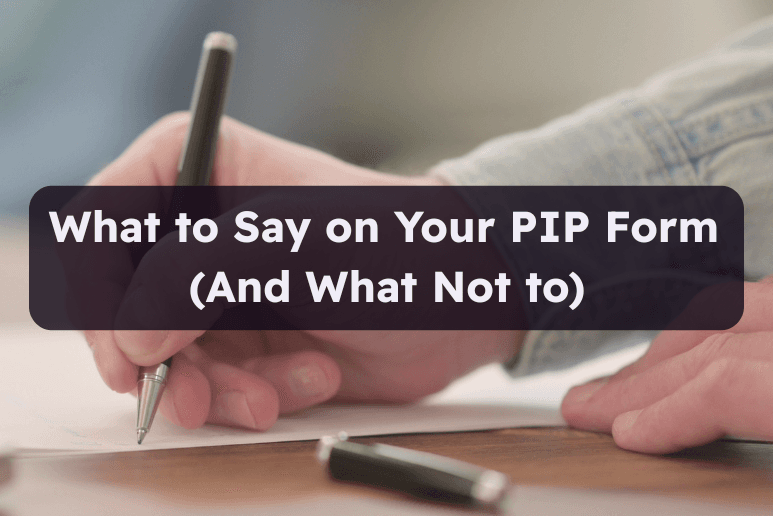All Articles
3 min read
What to Say on Your PIP Form (And What Not to)
Written by
Purpl
Published on
July 22, 2025

Filling in a PIP form is exhausting, and the way it’s worded can trip up anyone. It’s easy to downplay how much help you actually need or second-guess what to write.
This guide cuts through the jargon and gives you practical, no-nonsense tips on how to fill in your PIP form honestly and clearly — without accidentally talking yourself out of support.
What Is PIP, and Who Can Get It?
Personal Independence Payment (PIP) is a UK benefit for people living with a long-term physical or mental health condition or disability. It’s designed to help with the extra costs of daily life that come with being disabled.
You don’t need a specific diagnosis to qualify. What matters is how your condition affects your daily life — and whether those effects meet the criteria the DWP uses to assess claims.
You can get PIP whether you’re working or not, and it doesn’t depend on your income or savings.
Why the Way You Describe Things Matters
The DWP doesn’t just want to know what your condition is — they want to know how it affects you. And not just sometimes — but:
- Can you do the task safely?
- Can you do it reliably, every day?
- Can you do it within a reasonable time?
- Can you do it without help?
If the answer to any of these is “no,” you may qualify for PIP.
What to Say: Real Examples That Work
Here’s how to make your answers specific, relatable, and accurate — without medical jargon.
Instead of:
“I get anxious when I go out.”
Try:
“I avoid leaving the house unless someone is with me. I’ve missed appointments and run out of food because I struggle to cope with public spaces.”
Instead of:
“I can cook simple meals.”
Try:
“I can only use the microwave because I forget to turn off the hob or leave things unattended. I’ve burned myself and left pans on the stove, which is dangerous.”
Instead of:
“I get tired sometimes.”
Try:
“I feel exhausted after getting dressed. On many days I can’t even brush my teeth without resting. I often skip meals because I don’t have the energy to prepare food.”
What Not to Say
These are the most common mistakes people make:
- Saying “I just get on with it” — this minimises your reality.
- Focusing on good days — always talk about your average or worst days.
- Assuming they understand your condition — explain everything clearly, even if it feels obvious to you.
- Leaving out details — if something takes longer, causes pain, or needs help, say so.
PIP Form Tips (That Could Make or Break Your Claim)
- Use the “Extra Information” boxes for every section. This is your chance to give real examples and paint the full picture.
- Talk about your worst days, not your best ones.
- If a task causes pain, distress, or takes ages — say that.
- Get help from a benefits advisor, if you can. They know what the DWP is looking for.
- Keep a copy of everything you submit, in case you need to appeal.
Support and Resources
You don’t have to do this alone — and there’s free help out there:
- Scope’s Free Benefits Support
- Citizens Advice PIP Guide
- Turn2Us PIP Checker
- Mental Health & Money Advice – PIP Support
Final Thought
PIP isn’t about proving how strong you are. It’s about showing what life really looks like with your condition — not on your best days, but on your hardest ones. Be honest. Be detailed. And don’t do it alone.
Let us know if you want to share your experience to help others. You’re not the only one going through this — and your voice matters.

Sammi is autistic, has ADHD, and lives with POTS. She’s passionate about disability advocacy, accessibility, and creating spaces where people feel seen, heard, and understood. With a sharp sense of humour and a deep love for community, she speaks openly about the realities of being neurodivergent across all of her personal platforms, always aiming to challenge stigma, spark conversations, and remind others they’re not alone.
Other articles you might like:
DWP Confirms Small Benefits Increase for PIP, Carer’s Allowance & More
Going Abroad On PIP: The 4-Week Rule That Could Pause Your Payments
Changes to Universal Credit: What They Mean for Disabled People, and Where to Get Support
How to Challenge a PIP Decision in the UK: What to Do If Your Claim Is Refused or Underpaid
PIP Reform 101: Latest Update on Personal Independence Payment (PIP) Changes
